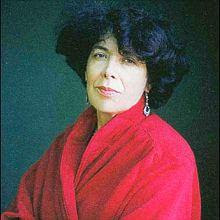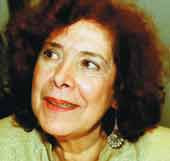Tuesday is my course at the Université de Paris VII: Love in the Middle Ages. The professor is great, and the reading list that made the French students groan (they’re accustomed to spending a semester doing a close textual analysis of one or two major works) seems normal by American standards. The class is about 30 people (including a guy pushing 60) and crammed into a small, hot room for three hours, but thus is school in France. Everything she said evoked memories of courses, books and scholars from my semester in Oxford—including an apparently not-dead idea for a novel I have set in medieval France. In short, this course will be intellectually orgasmic.
 Today was the one I’ve been waiting for: Assia Djebar’s class on Francophone lit. For anyone I haven’t told, Assia Djebar is a female Algerian writer whose works played a leading role in my senior thesis. Her works are generally recognized as some of the first and best examples of postcolonial North African literature, especially from a Women Studies point of view. She was also appointed to the Academie Française (an exclusive club around to regulate the French language…yeah, so it’s stupid and powerless but still a great honor) a few years back, making her the first francophone member and one of the first women. In short, she’s a big deal. From the impression I got from her novels and her accomplishments, she seemed a force to be reckoned with. The impression I got from other people after getting her was that she might be a little conceded and…well…difficult, as a teacher. The truth: my longtime literary idol has...well...been around for a long time. Assia Djebar is old.
Today was the one I’ve been waiting for: Assia Djebar’s class on Francophone lit. For anyone I haven’t told, Assia Djebar is a female Algerian writer whose works played a leading role in my senior thesis. Her works are generally recognized as some of the first and best examples of postcolonial North African literature, especially from a Women Studies point of view. She was also appointed to the Academie Française (an exclusive club around to regulate the French language…yeah, so it’s stupid and powerless but still a great honor) a few years back, making her the first francophone member and one of the first women. In short, she’s a big deal. From the impression I got from her novels and her accomplishments, she seemed a force to be reckoned with. The impression I got from other people after getting her was that she might be a little conceded and…well…difficult, as a teacher. The truth: my longtime literary idol has...well...been around for a long time. Assia Djebar is old. Granted, I knew that jacket photo I had in my head must be outdated, but when I entered the class I had to squint to see the resemblance. Dressed in costume jewelry, a dress low cut enough to reveal a protruding bra underwire, a gaudy turquoise jacket,
Granted, I knew that jacket photo I had in my head must be outdated, but when I entered the class I had to squint to see the resemblance. Dressed in costume jewelry, a dress low cut enough to reveal a protruding bra underwire, a gaudy turquoise jacket,tennis shoes and with the typically French old lady orange-red tinted hair, she looked more like a bewildered Parisian I might help out on the Métro than the defiant, sharp-tongued expat I had expected. She also wasn’t really on top of things, mentally. Although she asked for our names several times (there are only 5 of us) she couldn’t retain them, and pretty much settled on using “Laura” to address us all. Valérie, our program leader, sat-in on the class as a sort of personal secretary, reminding her several times of the attendance sheet and syllabus in front of, keeping time, keeping her on topic, and helping her find her point when she couldn’t find her way back after her frequent autobiographical tangents.
It was a little heart-breaking to watch, but I still have as much respect as ever for her accomplishments and her writing, and I can hardly hold her age against her. Also, while Djebar is getting a little senile and succumbing to the old lady tendency to blurt out observations best left as inner monologue, once she got past introductions and started talking about literature it was like her eyes lit up, her wit switched on and she was…well…brilliant. The effect of her position as an author is evident in her approach to a text, which really privileges the author and revels in specific vocabulary and the beauty of language. Plus, Djebar knows a lot of these authors, and has more or less lived these stories, and everything she says is supported with a childhood anecdote or real-life struggle. It was especially cool for me, having researched her so extensively last year, to have her in front of me, telling me things in person about her childhood and her relationship with French and Arabic that I had only read before.
After class, Valérie met up with us to touch base, saying essentially (and with an obvious, touching sense of sadness) that “we know Djebar is starting to lose her marbles, but there’s still a lot to be learned from her.” To make sure that we benefit fully from the course, Djebar will only teach every other week, and always aided by Valérie, and in the off weeks we’ll have guest lectures and discussions lead by other leading Francophone scholars in the Parisian area (including Christelle Taraud, an expert on women in the Maghreb, whose articles I read last year). All-in-all, I think it will be an intriguing, unforgettable experience, and it’s an honor to know that I will probably be among the last of NYU's students to study alongside the literary legacy that is Assia Djebar.

No comments:
Post a Comment